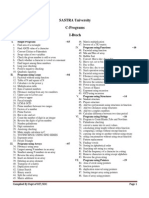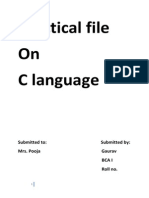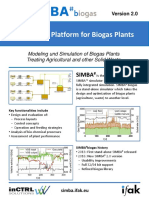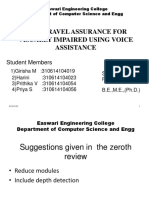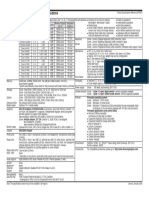AKTU B.
Tech 1st Year - PPS Important Programs (Unit-wise)
Unit 1 & 2: Basics of C Programming
1. Hello World Program
#include <stdio.h>
int main() {
printf("Hello, World!");
return 0;
}
2. Sum of Two Numbers
#include <stdio.h>
int main() {
int a, b;
printf("Enter two numbers: ");
scanf("%d %d", &a, &b);
printf("Sum = %d", a + b);
return 0;
}
3. Find ASCII value of a character
#include <stdio.h>
int main() {
char c;
printf("Enter a character: ");
scanf("%c", &c);
printf("ASCII value of %c = %d", c, c);
return 0;
}
Unit 3: Control Structures
4. Check Prime Number
#include <stdio.h>
int main() {
int num, i, flag = 0;
printf("Enter a number: ");
scanf("%d", &num);
for (i = 2; i <= num / 2; ++i) {
if (num % i == 0) {
flag = 1;
break;
}
}
if (num == 1)
printf("1 is neither prime nor composite.");
else if (flag == 0)
printf("%d is a prime number.", num);
else
printf("%d is not a prime number.", num);
return 0;
}
5. Print Fibonacci Series
#include <stdio.h>
int main() {
int n, t1 = 0, t2 = 1, nextTerm;
printf("Enter the number of terms: ");
scanf("%d", &n);
for (int i = 1; i <= n; ++i) {
printf("%d ", t1);
nextTerm = t1 + t2;
t1 = t2;
t2 = nextTerm;
}
return 0;
}
6. Find Factorial Using Loop
#include <stdio.h>
int main() {
int n, i;
unsigned long long fact = 1;
printf("Enter an integer: ");
scanf("%d", &n);
for(i = 1; i <= n; ++i) {
fact *= i;
}
printf("Factorial = %llu", fact);
return 0;
}
Unit 4: Arrays and Strings
7. Find Largest Element in Array
#include <stdio.h>
int main() {
int a[100], n, i, max;
printf("Enter number of elements: ");
scanf("%d", &n);
for(i = 0; i < n; i++) {
scanf("%d", &a[i]);
}
max = a[0];
for(i = 1; i < n; i++) {
if(a[i] > max)
max = a[i];
}
printf("Largest element = %d", max);
return 0;
}
8. Check if String is Palindrome
#include <stdio.h>
#include <string.h>
int main() {
char str[100], rev[100];
printf("Enter a string: ");
gets(str);
strcpy(rev, str);
strrev(rev);
if (strcmp(str, rev) == 0)
printf("The string is a palindrome.");
else
printf("The string is not a palindrome.");
return 0;
}
Unit 5: Functions and Recursion
9. Factorial Using Recursion
#include <stdio.h>
int factorial(int n) {
if(n==0)
return 1;
else
return n * factorial(n-1);
}
int main() {
int num;
printf("Enter a number: ");
scanf("%d", &num);
printf("Factorial of %d is %d", num, factorial(num));
return 0;
}
10. GCD Using Recursion
#include <stdio.h>
int gcd(int a, int b) {
if (b == 0)
return a;
else
return gcd(b, a % b);
}
int main() {
int x, y;
printf("Enter two numbers: ");
scanf("%d %d", &x, &y);
printf("GCD = %d", gcd(x, y));
return 0;
}
Unit 6: Pointers and Structures
11. Swap Numbers Using Pointers
#include <stdio.h>
void swap(int *x, int *y) {
int temp = *x;
*x = *y;
*y = temp;
}
int main() {
int a = 5, b = 10;
swap(&a, &b);
printf("After swap: a = %d, b = %d", a, b);
return 0;
}
12. Structure to Store Student Info
#include <stdio.h>
struct Student {
char name[50];
int roll;
float marks;
};
int main() {
struct Student s;
printf("Enter name: ");
gets(s.name);
printf("Enter roll number: ");
scanf("%d", &s.roll);
printf("Enter marks: ");
scanf("%f", &s.marks);
printf("Name: %s\nRoll: %d\nMarks: %.2f", s.name, s.roll, s.marks);
return 0;
}









